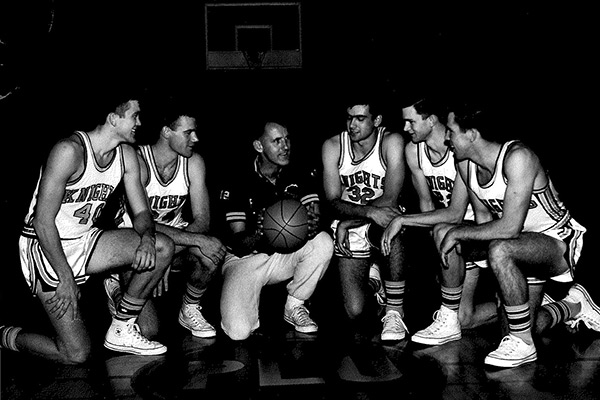Page 224 • (2,244 results in 0.117 seconds)
-
gradebook, and send announcements. This workshop is open to all faculty/instructors. Registration is required. 9:00 – 11:00 am | Orientation to Faculty Learning Communities – Hauge Admin 101 Jennifer Smith, Dean of Inclusive Excellence In this session, the facilitators of and participants in this year’s Faculty Learning Communities (FLC) will gather to review the history, goals, and research about FLCs, generally, so as to ground our work in a shared understanding of the features that make them
-

had to wear in P.E., the day we moved a hundred thousand books to the new library, intramurals, dorm competitions, Louis Armstrong in concert, a Hubert Humphrey speech, the first dances on campus, girls wearing pants only on weekends, upper campus for women, lower campus for men, Old and New Testament taught as half sermon, half lecture, half history, crew cuts and Jackie hair, The Mooring Mast, a new swimming pool, were we the Knights or were we Lutes when the saints came marching in? When you
-
bring a rich, lively analysis to bear grounded in the trio’s own personal experiences and expertise. Other Episodes+ In the podcast’s third episode, Hambrick talks with noted Trinidadian author Earl Lovelace, PLU English professor Barbara Temple-Thurston and dCenter alum Shelondra Harris ’17 about the university’s Trinidad and Tobago exchange program. The conversation covers PLU’s 25-year history with the twin-island republic, Harris’ experiences when she took part in the program and the Diversity
-
to cultivate relationships and get people to believe in what you’re doing.” Mikheyev, who studied art history as well as publishing and printing arts at PLU, is the marketing coordinator at Spaceworks. “My job includes a lot of social media, blogging, feature writing and graphic design,” Mikheyev said. “Other people do the work, and I just talk about it.” Mikheyev, who grew up in Russia, is quick to downplay his impact at Spaceworks, but his colleagues insist otherwise. “Dmitry brings to life in
-

, with 82 percent of its population living on less than $1 a day. It’s a country dominated by trade—now mostly beef, sugar and coffee—trying to elbow its way into tourism and leave behind a past crowded with civil war, damaging foreign involvement and corrupt politicians. PLU students learned about the history of Nicaragua through a series of interdisciplinary lectures scheduled by Mulder that explored the environment, ethics and culture of a country that still struggles to provide basic necessities
-
, she had to branch out to surrounding Tacoma, Parkland and Spanaway schools to meet other people of color. After joining the heritage speakers cohort, Pinedo Chipana gained so much more, particularly a heightened ability to communicate with her relatives from Peru, where she was born. “My parents know all the history,” she said. “I was able to relate more to what they were talking about. When I learned about the history, I could finally understand what they were talking about.” Rojas Apodaca, a
-
academic year PLU notifies students of their borrowing history at the university, including anticipated monthly payments when in repayment and the total loan payoff amount. During the academic year, if a loan amount is changed where the anticipated monthly payment or total loan payoff will increase or decrease, students will be notified via email and can view these changes on Banner web.
-
of Educational Assessment Retention: 3 years after end of quarter Disposition Method: Shred Other Copy: Faculty/Academic Departments Retention: 3 years after end of quarter Disposition Method: Shred Course History Files: A record of the content of approved academic courses. May include course descriptions, syllabi and bibliographies, sample examinations, etc. Official Copy: Academic Departments Retention: until course is dropped Disposition Method: Transfer to Archives for review Curriculum
-
Discussion Discussion on pharmacology topics specific to population focus. Co-requisite: GNUR 711. (1 seminar) GNUR 713 : Advanced Physical Assessment Development and performance of the skills needed for advanced health assessment of individuals, families, or communities through the lifespan. Provides knowledge to complete a comprehensive history, physical, and mental health exam leading to the development of a differential diagnosis. Incorporates assessing wellness, screening, and chief complaint. (3; 1
-
Discussion Discussion on pharmacology topics specific to population focus. Co-requisite: GNUR 711. (1 seminar) GNUR 713 : Advanced Physical Assessment Development and performance of the skills needed for advanced health assessment of individuals, families, or communities through the lifespan. Provides knowledge to complete a comprehensive history, physical, and mental health exam leading to the development of a differential diagnosis. Incorporates assessing wellness, screening, and chief complaint. (3; 1
Do you have any feedback for us? If so, feel free to use our Feedback Form.


